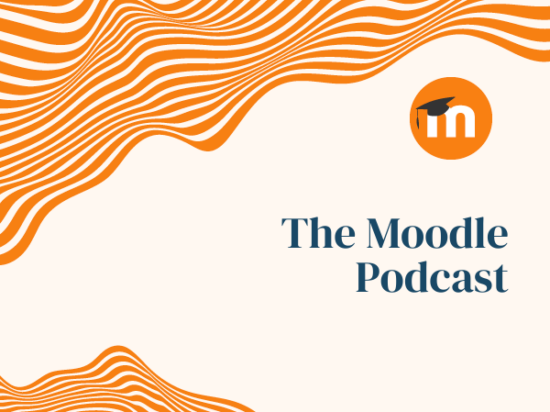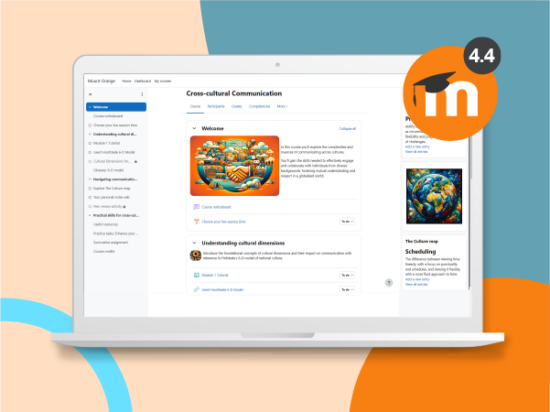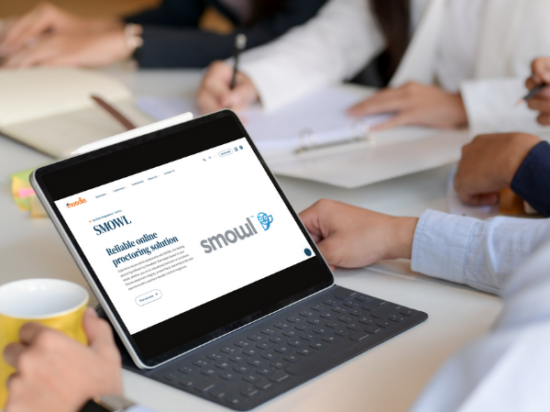Following Moodle’s introduction to Universal Design for Learning, this blog explains how Moodle LMS, the open source platform at the heart of the Moodle ecosystem, can be used to provide learners multiple means of engaging with learning materials and each other. Moodle LMS includes many features that allow educators, or anyone utilising Moodle to deliver an online course, to create alternatives to recruit student interest, sustain learner effort and harness the power of emotion in achieving learning goals.
Provide options for recruiting interest
In providing learners multiple means of engagement, it is important to present alternative ways to recruit learner interest. Offering learners choice, creating authenticity and relevance to their context and minimising threats and distractions can develop self-determination, pride in accomplishment, and increase the degree to which they feel connected to their learning.
Utilise Moodle LMS to recruit learner interest by providing choices or alternatives in:
1. The type of rewards or recognition available.
Badges, which are standard to Moodle, are a good way to celebrate achievement and show progress. Course certificate, a Moodle plugin, allows for the dynamic generation of certificates based on predefined conditions set by a teacher and the Experience Points (XP) plugin set contains a gamification point system to reward student accomplishment.
2. The sequence or timing for completion of subcomponents of tasks.
Activity completion allows a teacher to set completion criteria in a specific activity’s settings and Moodle’s Restrict Access feature enables teachers to restrict the availability of any activity or even a course section based on dates, completion of previous activities, grades etc.
3. Setting their own personal academic and behavioural goals.
A standard feature of Moodle, Blogs allow learners to record personal information and goals as each user on a Moodle instance has their own blog. The Moodle plugin, Checklist works with the checklist module and displays progress bars for a single checklist which allows learners to track completion of their goals.
4. Design activities so that learning outcomes are authentic, communicate to real audiences and reflect a purpose that is clear to the participants.
Moodle Competencies allow educators to create transparent learning outcomes for learners. Educators can add competencies to courses and course activities, view a competency breakdown report and rate the competencies of learners.
5. Provide tasks that allow for active participation, exploration and experimentation.
Utilise Moodle’s many standard features to encourage learner interaction and experimentation. For instance, create learner Groups, set Assignments, encourage collaboration through peer assessment with Workshops and allow students to create collaborative project plans and documents through Wiki.
6. Invite personal response, evaluation and self-reflection to content and activities.
Moodle’s Forum activity allows students and teachers to exchange ideas by posting comments as part of a ‘thread’, while Blogs allow learners to record reflections about their learning activities. In addition, the Feedback activity allows educators to create and conduct surveys to collect feedback.
7. Include activities that foster the use of imagination to solve novel and relevant problems.
Standard Moodle features that encourage collaboration and use of imagination include Groups, Assignments, Workshops and Wiki.
8. Help learners anticipate and prepare for changes in activities, schedules, and novel events.
Moodle Announcements forum, Calendar, Notifications and Messaging provide a diverse set of tools to keep learners up to date with course requirements.
Provide options for sustaining effort and persistence
Many kinds of learning, particularly the learning of skills and strategies, require sustained attention and effort. While cultivating intrinsic motivation in students is the ultimate goal, any learning environment, including those delivered online, should promote the development of these qualities through assisting students with remembering and managing learning goals and encouraging sustained effort with rewards. This can be achieved by providing variation in resources and demands, increasing feedback and promoting opportunities to foster collaboration and community.
Utilise Moodle LMS to foster effort and persistence by:
1. Requiring learners to explicitly formulate or restate goals.
Moodle Blogs allow learners to record personal information and express learning goals, plus the Forum activity allows students to communicate with each other and their teacher about their learning materials and goals as part of a ‘thread’.
2. Encouraging division of long-term goals into short-term objectives.
Educators can encourage students to break down goals by utilising Activity completion which allows a teacher to break down and set completion criteria in a specific activity’s settings. Moodle’s Restrict access enables educators to restrict the availability of any activity or even a course section based on dates, completion of other activities, grades etc.
3. Engaging learners in assessment discussions of what constitutes excellence.
Moodle Forum allows for lively and live communication between learners and their teacher to share learnings, different perspectives and agree best practice.
4. Differentiating the degree of difficulty or complexity within which activities can be completed.
Restrict access to learning material based on complexity or utilise Lesson activity to create “branching” or differentiated exercises to accommodate different learning preferences or abilities. Equally, H5P allows educators to create a range of text-based and audio-visual content of varying complexity. Use Branching Scenarios on Moodle Quiz to allow questions to be introduced based on the success or failure of previous questions.
5. Varying the degrees of freedom for acceptable performance.
Group and User Overrides allow you to set different deadlines and timings for students of differing ability.
6. Creating cooperative learning groups with clear goals, roles, and responsibilities.
Create learner Groups, set roles, Assignments, encourage collaboration through peer assessment with Workshops and allow students to create collaborative project plans and documents through Wiki.
7. Providing prompts that guide learners in when and how to ask peers and/or teachers for help.
Learners can access a Page Resource to link to a screen that displays the content created by a teacher in a more accessible format or embed multimedia prompts into multi-page Book Resources. Moodle’s Glossary auto linking filter also provides meaningful prompts for learners as they engage with course content.
8. Providing feedback that emphasises effort, improvement, and achieving a standard rather than on relative performance.
Assignment has many feedback options from premade rubrics to frequently used comments to personalise feedback including text, audio and video format.
9. Provide feedback that is frequent, timely, and specific.
Quiz can generate feedback for each correct and incorrect question ranging from a general overview to specific hints. One-to-one Forums and private Messaging between learner and educator can also be used to facilitate personalised feedback.
Self regulation
The ability to self-regulate, to regulate one’s emotional reactions or states in order to be more effective at coping is a critical aspect of human development. While many individuals develop self-regulatory skills on their own, it is important to foster learners’ capacity to manage their own engagement and affect.
Utilise Moodle LMS to support learners ability to self regulate by:
1. Elevating the frequency of self-reflection and self-reinforcements.
Entwine the use of Moodle Blogs into course activities to allow learners to record personal information and express learning goals.
2. Increasing the length of on-task orientation in the face of distractions.
Create timed Quiz or Assignments with gradual increments over the duration of a course.
3. Support activities that encourage self-reflection and identification of personal goals.
Utilise Moodle Blogs, Forum and Assignments to foster collaboration and reflection.
4. Use real life situations or simulations to demonstrate coping skills.
Utilise Forum and Wiki to foster teacher and student support of each other and simulate real life experience by allowing students to contribute to and collaborate on learning activities and course design.
5. Encouraging learners to seek external emotional support – peers, mentors, teachers.
Encourage use of one-to-one Forums and private Messaging between learner and educator. Group Messaging and Forums can also be used to encourage social interaction.
6. Utilise tools, devices, aids to assist learners to collect, chart and monitor their behaviour and feelings over a learning program.
Both educators and learners can track progress through Grades, Competencies, Activity Completion and Badges. The Feedback activity and Survey activity collects learners’ perception about a course, while Choices can be useful as quick polls to stimulate thinking about a topic; to allow the class to vote on a direction for the course, or to gauge progress.
What to learn more? Moodle has also created a variety of ways for educators to learn how to create meaningfully designed online learning environments ranging from courses on Learn Moodle Basics and Moodle Teaching Basics to Moodle Teaching Next Level and the Moodle Educator Certification (MEC) Program. MEC is based on the widely-used and accepted European Framework for the Digital Competence for Educators (DigCompEdu).
What is Universal Design for Learning?
Universal Design for Learning (UDL) involves using a variety of teaching methods or pedagogical approaches that provide learners with a range of ways to access learning material, engage with it and exhibit the knowledge that they have acquired. Based on scientific insights into how people learn, the UDL Guidelines provide a set of concrete suggestions in how to implement Universal Design for Learning to reduce barriers and maximise learning opportunities for all learners. These suggestions are grouped in 3 key areas:
- Providing multiple means of engagement (What tools can I use to engage all learners?);
- Providing multiple means of representation (How can I present information in ways that reach all learners?); and
- Providing multiple means of action and expression (How can I offer purposeful options for students to show what they know?).
References
https://mtsac.libguides.com/udl/engagement
https://udlguidelines.cast.org/
https://www.understood.org/en/school-learning/for-educators/universal-design-for-learning/understanding-universal-design-for-learning
https://www.cast.org/impact/universal-design-for-learning-udl



